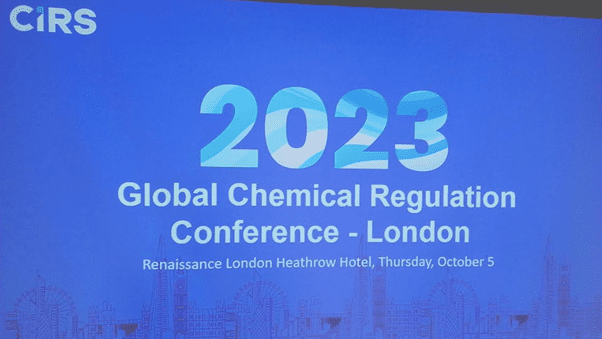
Insights on the CIRS Global Chemicals Regulation Conference 2023

This blog was originally posted on 16th October, 2023. Further regulatory developments may have occurred after publication. To keep up-to-date with the latest compliance news, sign up to our newsletter.
AUTHORED BY DIEUDONNÉ YMEDJI, SENIOR REGULATORY COMPLIANCE SPECIALIST, COMPLIANCE & RISKS
CIRS Global Chemical Regulation Conference, October 2023
The CIRS Global Chemical Regulation Conference took place in London on 05 October 2023. The event gathers key chemicals industry stakeholders, including manufacturers, distributors, regulatory affairs managers, representatives from government organizations and regulatory services providers.
This one day conference provided attendees with a high-level overview of the current chemicals regulatory landscape across the EU, China, South Korea, Turkey and the UK. The variety of topics covered include:
- An overview of current EU Chemicals Policy
- Latest EU CLP and global GHS updates
- Introduction to K-REACH and K-BPR in South Korea
- Exploring chemical management regulations in China
- Recommendations in meeting KKDIK (Turkey REACH) registration deadline
Current EU Chemicals Policy
Marko Susnik, senior advisor of the Austrian Federal Economic Chamber (WKO) explored the ongoing changes envisaged in the EU to better achieve higher protection for health and the environment from hazardous chemicals and to support the EU’s competitiveness. Aspects discussed in his presentation included:
- The Chemicals Strategy for Sustainability (CSS) which foresees the development of a framework to define safe and sustainable by design (SSbD) criteria for chemicals and materials
- The delayed REACH revision proposal which is creating uncertainty for the industry as regards the phase-out of the most hazardous chemicals, the reform of the restrictions and authorization process, the registration/notification of polymers, the clarification of the essential uses concept. Initially expected for publication at the end of 2022, the proposal is now set for the end of this year or anytime in 2024.
Latest EU CLP and Global GHS Updates
Michael Hemberg, CEO of Lisam Systems, enlightened the audience with the latest changes to the EU CLP Regulation and the UN GHS (10th revision).
Delegated Regulation (EU) 2023/707 amending CLP Regulation No, 1272/2008 published at the end of March 2023, introduced new hazard classes and criteria for the classification, labeling and packaging of substances and mixtures. These are:
- Endocrine disruptors (ED)
- Persistent, bioaccumulative and toxic (PBT) or very persistent or very bioaccumulative (vPvB)
- Persistent, mobile and toxic (PMT) and very persistent, very mobile (vPvM)
The new classifications will come into force on 01 May 2025 for substances and on 01 May 2026 for mixtures. A timeline of 18 months (11 November 2026) is foreseen for substances already on the market on 01 May 2025, while a transitory period of two years (02 May 2028) is granted for mixtures already on the market before 04 May 2026.
K-REACH and K-BPR in South Korea
Keynotes from presentations on South Korean K-REACH and K-BPR include:
- The upcoming 100-1,000/t registration deadline for 31 December 2024
- The first public consultation on the first designation of substances for the Candidate List concluded in February this year. (Note – under K-REACH, substances subject to authorization must obtain authorization from the MoE prior to production, import or use in South Korea, even if the substances have already completed registrations)
- The comprehensive description of the 48 existing active substances within Group I that secured authorization in 2022 as well as an emphasis on the looming deadline of 31 December 2024 for Group 2 biocidal type products (i.e. wood preservatives)
Chemical Management Regulations in China
Dean Winder, senior regulatory consultant at CIRS Europe, provided a synopsis of China GHS and regulations pertaining to the management of new and existing chemical substances. He delineated the challenges faced by the chemical industry with respect to certain key aspects of MEE Order 12. These include:
- The approval criteria for confidential business information (CBI) applications
- The absence of standard test methods for polymer stability assessment
- A lack of guidance for the socio-economic benefit analysis report
He further put emphasis on the “One enterprise, one chemical product, and one QR code” policy introduced in 2022 in order to facilitate the information management of hazardous chemicals. Under this policy, each registered chemical gets a unique QR code for information exchange. Businesses must print or affix this safety information code on the inner and outer packaging of any hazardous chemical manufactured or imported into China. The safety information code could be used by downstream users to access safety information, emergency measures and Safety Data Sheets. The policy has been so far implemented only in Guangdong, Jiangsu, Fuzhu, Shandong, Zhejiang, Beijing, Hebei, Sichuan Provinces.
He also shed light on the current Ministry of Industry and Information Technology (MIIT) proposal aiming to replace the current regulation GB 13690-2009 with GB 30000.1 in order to align with UN GHS Revision 8th.
KKDIK (Turkey REACH) Registration Deadline
Finally, the audience was reminded about the KKDIK (Turkey REACH) registration deadline of 31 December 2023 of chemical substances (on their own or in mixtures or intended to release in articles) manufactured in or imported into Turkey in a quantity of 1 ton or more per year. Businesses that fail to register their chemicals by this deadline may face legal consequences and hefty fines.
Elif Koç, Managing Partner at Chemleg, also explored some of the challenges faced under KKDIK, such as the time-consuming nature of the registration process, the lack of clear guidance from regulatory authorities regarding the postponement. For a timely and effective compliance, she advised to initiate registration dossiers preparation early and to seek support of experts to ensure that all essential documentation is adequately supplied.
Stay On Top Of Your Changing Regulatory Obligations
Tell us your compliance challenges and we will find the solution that’s right for you.


